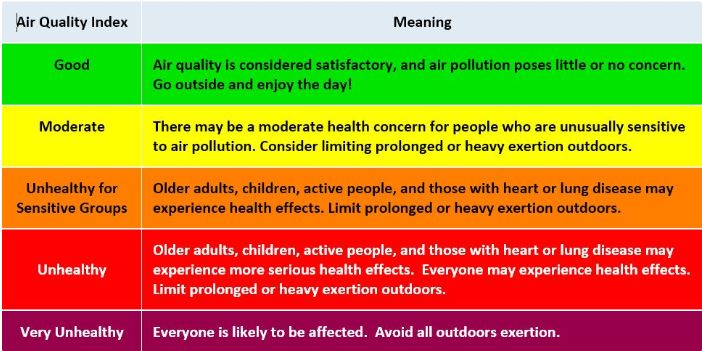This news item expired on Thursday, November 1, 2018 so the information below could be outdated or incorrect.
Monitoring the Air with Your Health and Safety in Mind
Ozone season is officially underway in Buncombe County. The ozone monitoring and forecast season runs from March 1-Oct. 31. The Western North Carolina Regional Air Quality Agency monitors and regulates Buncombe County's air quality to safeguard public health and the environment, while preserving the quality of life and economic vitality of the area. During ozone season, WNC Regional Air Quality Agency will report daily forecasts for both the valleys and ridgetops of Asheville and Buncombe County.
Air quality across the state has improved significantly over the past decade due to declining emissions from industry and motor vehicles and more stringent standards. In recent years, ozone levels have been the lowest since the state and local agencies began monitoring the air in the early 1970s. All of North Carolina currently meets the new, more stringent federal ozone standard that was adopted in October 2015.
Know the Code

Air Quality and Your Health
As part of its mission the WNC Regional Air Quality Agency reports air quality forecasts which are related to two pollutants, ozone and fine particles. WNCRAQA reports (usually by 4p.m.) what the projected air quality will be for the next day. Schools are notified via email of daily air quality forecasts starting in March through the end of October, as well as if there is an air quality alert due to high particulate levels during the rest of the year. This helps to alert the community to “Air Quality Action Days” when unhealthy air quality conditions are predicted in the code yellow, code orange, code red, or code purple categories. “Air Quality Index-A Guide to Air Quality and Your Health,” detailing the various levels of air pollution alerts and their health consequences, can be found on the EPA Air Now website, accessible from the WNCRAQA website.
WNCRAQA encourages you to consider establishing policies to protect children from avoidable exposure to harmful high air pollution levels. Some policies you might consider include arranging indoor alternatives to regularly scheduled outdoor activities (recess, athletic practices, etc.) for days when unhealthy air quality levels are predicted. Adopting an anti-idling policy for cars and buses can also be beneficial.
Ozone is a naturally occurring, colorless gas. During the warmer months, levels of ozone can increase well above natural levels due to chemical reactions between emissions from automobiles, electric utilities, and pollutants from other sources. Excessive ozone at ground level is harmful to health, especially to the health of school-aged children. The airway of a child is narrow and irritation that would produce only a slight response in an adult can result in potentially significant obstruction in the airway of a child. Children breathe more rapidly and inhale more pollutant per pound of body weight than do adults. In addition, ozone may hamper proper development a child’s lungs, which are more sensitive and susceptible to damage from air pollution. Asthmatic children playing outdoors on high ozone days are 20-40 percent more likely to suffer an asthmatic exacerbation.
Particle pollution, which consists of very small particles and liquid droplets in the air, can be harmful to breathe and contributes to haze and other air quality problems. Fine particles can penetrate deeply into the lungs and absorb into the bloodstream, causing or aggravating heart and lung diseases. Persons most susceptible to particle pollution include those with heart and respiratory conditions, the elderly and young children. Unlike ozone, which is usually highest in the afternoons, particle levels can be high at any time of the day. Sensitive groups should take special care to limit their physical activity during high particle periods.
Citizens can obtain air quality information by visiting the WNC Regional Air Quality Agency website and air quality forecasts by visiting the North Carolina Air Quality Forecast Center.
Please contact WNCRAQA with any questions.
WNC Regional Air Quality Agency
52 Coxe Avenue
Asheville, NC 28801
Phone: 828.250.6777
www.wncairquality.org